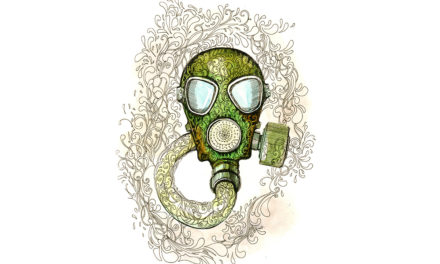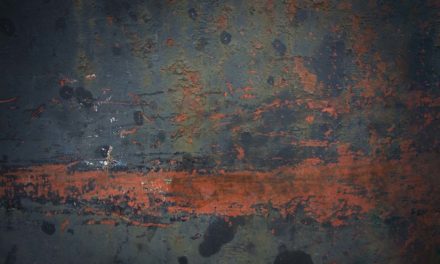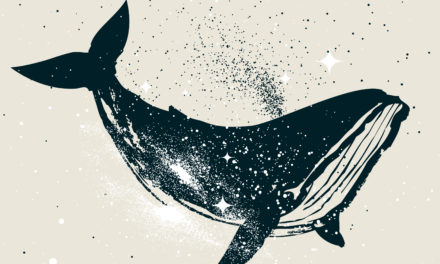Spencer
by Tara Campbell
Issue 7: Horror | 1,893 words

© Theus/Adobe Stock
She could have fixed me. It would have been simple enough. All of this could have been avoided if she’d only made an effort.
I didn’t intend to take much. I only needed something small from her, something she would barely miss. Something tiny but useful. She used to find me useful—not in the sense of being necessary, but she thought about me and took me with her more often than not. I used to make her smile.
Yet now we find ourselves in this room: you, an officer of the law, and me, the problem that has landed in your office. She’s told you that’s what I am, a problem—which is not what I had intended to be. I really hadn’t thought that far ahead. Though, thinking now about thinking ahead, I realize how much went into choosing the right one.
But I digress… I started with something small. A finger. A pointer finger. I’d thought about starting with the ring finger, which would have been meaningful, but not as useful, and I didn’t want to be wasteful. I was merely trying to do this the best way I knew how.
And yes, she did miss the finger. Made quite a fuss over it, actually, which was annoying considering how long she’d let my bones lie around in a drawer without ever doing anything with them. She never lifted a finger—ha! I’m sorry. The more there is to me, the more levity I feel—the heavier I am, the lighter I am. Isn’t that funny?
I think it’s funny.
But no, of course, it’s not so funny for you. You’re the one who has to figure out how to help her now. If you look at it a certain way, it’s not my fault. The parts were all there, and it wouldn’t have cost her much time at all to fix me. And now her neglect has cost her everything.
Almost everything.
To be fair, she did mean to do something. She kept my bones, and she intended to put me back together. All she needed was a little more string. But when you get right down to it, meant to and did are two different things.
The difference is, I actually did: I took her finger while she was sleeping, and I hid it underneath my bones, where she would never find it because she had long since stopped paying attention to me. When she woke up, she went to the doctor—really the last place she should have looked because, of course, the doctor didn’t have it. All the doctor could do was ask what she’d done, what she’d eaten, where she’d traveled—everything but what she didn’t do for me.
Well, the doctor couldn’t have known. And she learned to do without the finger pretty well, even as I found that having it on its own wasn’t as useful as I’d hoped. I needed a thumb, an opposing thumb—that’s what makes all the difference, isn’t it, what enables apes and men to accomplish more than all other beasts. Two fingers opposed yet united for a greater good. Without them, it would have taken so much longer to stitch myself together.
I took her thumb next, but my mistake was taking the thumb from her other hand. I thought it would be easier for her to get by with only one digit missing from each hand, but it turns out, the two I’d chosen were clumsy together. Not useful, not helpful, only full of problems. So, I had to take the other thumb too, which wasn’t easy. By then, she wasn’t sleeping much at all.
Yes, her boyfriend was helping keep watch then too, but that didn’t work, did it? That never works, not when objects such as myself are concerned.
Indeed, I still call myself an object sometimes. I refuse to forget my roots. I won’t deny that I began life as a novelty ring, giggled over in a shop in New Orleans. I was once only a silver skull with faux-ruby eyes and tiny silver bones strung into a circle with elasticized twine. One size fits all. I could have belonged to anyone, but I chose her.
And she appreciated me properly for a while. She wore me to work, out for drinks with friends, on dates with promising men. I was a litmus test, in a way. If they didn’t like me, they weren’t the right kind of man for her. And it worked—I worked. She met her current boyfriend under my glittering eye, and, before his unbelieving eyes, he lost her to me.
I fully intended to stop after taking her hands. The individual fingers weren’t enough for my work, but with full hands, I thought, I could find more materials and fashion them into a fitting body. I finger-walked her hands through back alleys, mostly at night to avoid commotion, and searched for schools, daycares, parks, anywhere a child might have lost a toy.
I wasn’t choosy at first—my first body was a stout, bouncing baby doll. My second was a slender Barbie; my face fit perfectly over hers, covering it like a grinning silver mask. But, you can imagine the problem right away: anything that was proportional to my ring-sized head was minuscule compared to my new hands, and even with the strength of sturdy baby doll arms behind them, the hands proved difficult to manipulate.
Another difficulty was that I could only show myself in the emptiness of night. People who saw me toddling around as a babe wanted to pick me up and cuddle me. Those who saw me sashaying along as a skull-masked Barbie wearing massive “gloves” itched to tear off my head, driven by nostalgic childhood mischief, or to dismember me for installation art. Only when they caught me did they see what I was. Invariably, they screeched and threw me down in terror, concussing me on more than one occasion.
Your expression, Officer, tells me you’ve heard the reports, perhaps taken them down yourself. Through your revulsion shines a clarity, a relief almost, now that you can see the source of the nightmarish stories. Sitting before you, I must provide a feeling of resolution for you. But for me… You can’t understand how unbearable the hiding, the violence, the whole in-betweenness of my existence had become. And so, I faced a choice.
And so, I built. At first I filched mannequin parts from behind department stores, affixing the battered remnants one at a time: arms to wrists, torso to arms, head on top. I found a hollow, discarded head with a perfectly-sized hole in its eye to accommodate me in my elemental self, meaning my actual—not my constructed—self. The head’s color didn’t match the torso, which in turn didn’t match the legs. The arms and legs were also different sizes and possibly didn’t match the gender of the breasted torso. In fact, the toes of one foot were slightly pointed, while the other foot remained flat. I walked with a peculiar tilt in my step.
I found I could get around reasonably well if I covered myself in coats and long dresses and donned a hat or wig to cover most of my face. But there was always my gait. Honestly, I hobbled. At best, I got my walk down to a mere shuffle and was thus written off as an addict. For that, I was left mercifully alone, which brought peace initially, but soon enough, loneliness.
As the weeks dragged on—I was that patient, mind you, weeks. For the weeks during which she retained full possession of the rest of her body—yes, yes, except her hands—I became increasingly despondent. I was in no condition for polite society. At this point, I was something more than a ring on a hand to be ogled, but far less than a being deserving of friendship. The only souls who addressed me were barely present in their own bodies, derelicts too out of their minds to truly fathom the being they had stumbled up to meet. The only eyes that sought mine were distressingly vacant themselves.
If the mannequin limbs had been more flexible, if I could have disguised myself more effectively, I might have managed to avoid a reaction of terror long enough to engage in a snippet of conversation; might have tiptoed shyly toward a friendly exchange in some corner of a darkened pub, toward some bit of human warmth. Perhaps eventually, I might have inched toward acceptance. If any of that had been possible, I might have remained content. But I could never approach places where humans congregate without my gait exciting curiosity, followed by horror.
And so, I built again. This time, I was no longer satisfied with secondhand (so to speak) materials. I would only be able to complete my project with resolve and at much cost, not only to her, but to both of us.
For I am not as hard-hearted as she would have you believe, Officer. I too grieved every time I had to reenter her dreams—now unending nightmares—to take a foot here, a knee there, an elbow, a hip. I tried to focus on joints, thinking it the least invasive way to get the flexibility I wanted from the mannequin appendages. I know you humans have joint replacements. I spend a lot of time watching TV by myself, so I’ve seen all of the advertisements. Indeed, a distressing number of them regard litigation for faulty replacements. I took great care to do my research before I took anything from her and always left behind literature on the most dependable devices to replace what I took.
I could have stopped there, I suppose, with both of us as patchwork beings—me a scarecrow of plaster limbs bending on human joints, her a jumble of steel and space-age polymers swathed in scars. We were unique, you have to give me that. We could have both remained special, novel, beautifully obscure beings. But once again, she proved unable to take care of her things.
Infection set in. Don’t ask me how, but she began to rot as she lived and was in danger of losing the little I’d left her. So, wasn’t it, in the end, more responsible of me to take the rest?
The very last bit of her is in another office in this building, I suppose, filing a complaint against me right now: body stolen from head. But if she were to see her body, she’d find it’s not what it once was. I’ve had to make some alterations due to the piecemeal nature of the taking and her negligence, which resulted in infection. It’s best she never knows what her body looks like now.
It’s not hers anymore to decide, anyway.
In fact, you should let me go now, Officer, before she happens upon me. Before I decide to start again, fresh, and do it properly this time: all at once, instead of piecing myself together in a patchwork of scraps.
Do you mind if I ask how tall you are, Officer?
Yes, the more I think about it, the more strongly I feel you should let me go right now.
But you won’t will you?
Pity.
For you.

Tara Campbell
Tara Campbell (www.taracampbell.com) is a writer, teacher, Kimbilio Fellow, and fiction editor at Barrelhouse. Prior publication credits include SmokeLong Quarterly, The Masters Review, Monkeybicycle, Jellyfish Review, Booth, Strange Horizons, and Escape Pod: ARTEMIS RISING. She’s the author of a novel, TreeVolution, a hybrid fiction/poetry collection, Circe’s Bicycle, and a short story collection, Midnight at the Organporium. She received her MFA from American University in 2019.




